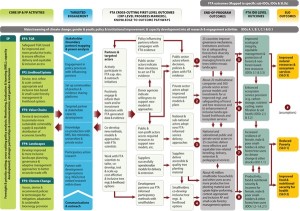
The CGIAR Research Program on Forests, Trees and Agroforestry (FTA) is an integrated global research initiative that aims to enhance the management and use of forests, agroforestry and tree genetic resources as a way to improve livelihoods and sustain environmental values.
The program itself is an experiment. It is testing methods, approaches, partnerships, and engagement strategies, seeking the most effective means of achieving positive change. Therefore, the program requires an effective and innovative system to monitor, to evaluate and to assess the impact of its work.
The FTA monitoring, evaluation, learning and impact assessment (MELIA) system is set up to:
- Encourage an ‘impact culture’ within FTA in which research, engagement and capacity development activities are explicitly defined, designed and implemented to contribute to transformative change
- Ensure that FTA’s work remains relevant and useful in rapidly changing and complex circumstances, by ensuring that ex-ante and ex-post evaluations and impact assessments are incorporated in future project design
- Guide ongoing research, engagement and capacity development to maximize effectiveness
- Provide a framework for FTA to learn from its own experience about what works best and how to focus, design and manage its work in the future
- Provide evidence that FTA’s work is effective and that investments in FTA contribute to better livelihoods and greater environmental sustainability
- Contribute to research and methodology development for evaluating research, capacity strengthening, and communications for natural resources management research, poverty alleviation and environmental sustainability
- Integrate impact assessment as a genuine research activity, by explicitly linking it to research activities implemented by the Flagships
MELIA groups of activities were organized to contribute to planning, monitoring and evaluation of outcomes and impacts of the whole research program. To do so, we will conduct three research activities:
(i) foresight analysis,
(ii) outcome/impact assessment, and
(iii) policy analysis.
The work of the MELIA team is guided by the above Theory of Change.
